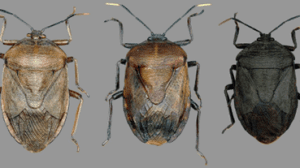TAG: GS-3: ENVIRONMENT AND ECOLOGY
CONTEXT:
Researchers have discovered three new edible stink bug species, Coridius radii, Coridius inspirators, and Coridius esculentus, in northeast India.
EXPLANATION:
Shield Bugs are a group of insects known for their distinctive shield-like shape. These insects are part of the order Hemiptera, which also includes other true bugs like aphids and cicadas. Shield bugs are often recognized by their broad, flattened bodies and can be found in various habitats.
The species mentioned (Coridius adii, Coridius insperatus, and Coridius esculentus) were recently discovered and identified as new members of this group. These discoveries contribute to understanding biodiversity and the diversity of shield bugs.
- Coridius adii: It is named in honour of the Adi tribe, one of the major groups inhabiting mainly the Siang valley in Arunchal Pradesh, which consumes this species as food. The insect is described as pale brown to dark brown with irregular yellow patches on its upper body.
- Coridius insperatus: It is distinct from all other species in the group. It has four segmented antennae and a copper-coloured back, while other similar bugs have five segmented antennae and are dark brown, yellow, or black on top.
- Coridius esculentus: It was discovered during a socio-economic survey when researchers observed that while the bugs are popular delicacies, consuming the darker-coloured insect in large quantities causes intoxication. Those consuming Coridius esculentus become “photophobic, exhibiting behaviour such as wanting to hide under carpets or beds.
Coridius bugs are relatively large, ranging from 15 to 25 cm in size and mainly feed on plant sap. The study also rediscovered Coridius fuscus, Coridius laosanus, and Coridius assamensis, which were not reported for over 100 years from the region.

Source:
Spread the Word



